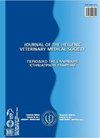Investigation of the Epidemiology of Small Ruminant Lentivirus Infections southeast part of the Marmara region of Turkey
IF 0.4
4区 农林科学
Q4 VETERINARY SCIENCES
引用次数: 0
Abstract
Small ruminant lentiviruses (SRLVs) are viral pathogens that are common in goats and sheep, affect production, and cause significant economic losses in small ruminant breeding. Caprine arthritis encephalitis virus (CAEV) and Maedi-Visna virus (MVV) are prototypes of SRLVs. Both of them affect animal health and welfare in sheep and goats and cause progressive and persistent infections in the small ruminant industry. The present study aimed to reveal the epidemiological status of lentivirus infection in the sheep region in Yalova province located in the southeast part of the Marmara region and determine the circulating genotypes by conducting the sequence analysis of the samples detected positive by a molecular method and molecular characterization of the detected field strains. To that end, 231 sheep blood samples were used between May 2016 and April 2018. Based on sampling results of the PCR test and ELISA tests, 5.62% (13/231) and 5.19% (12/231) positivity rates were found in sheep, respectively. According to the ELISA test results, a significant difference was found in terms of age groups (6 months -1 age, 1-3 age, >3 age) (χ2: 6.01; p=0.04). Furthermore, the sequence analysis of the gag gene region detected the existence of the A genotype of small ruminant lentiviruses in sheep. The data obtained from the study revealed a low seroprevalence course of SRLV infection in the study area in the absence of a systematic disease control program.土耳其马尔马拉地区东南部小反刍动物慢病毒感染流行病学调查
小反刍慢病毒(Small ruminant lentivirus, srlv)是山羊和绵羊中常见的病毒性病原体,影响生产,并给小反刍动物养殖造成重大经济损失。山羊关节炎脑炎病毒(CAEV)和maedii - visna病毒(MVV)是srlv的原型。它们都影响绵羊和山羊的动物健康和福利,并在小型反刍动物行业引起进行性和持续性感染。本研究旨在通过对马尔马拉地区东南部亚洛瓦省羊区慢病毒检测阳性样本进行分子序列分析,并对检测到的田间菌株进行分子鉴定,揭示该地区慢病毒感染的流行病学现状,确定其流行基因型。为此,在2016年5月至2018年4月期间使用了231只羊的血液样本。PCR检测和ELISA检测的抽样结果显示,绵羊的阳性率分别为5.62%(13/231)和5.19%(12/231)。ELISA检测结果显示,不同年龄组(6个月-1岁、1-3岁、0 -3岁)间差异有统计学意义(χ2: 6.01;p = 0.04)。此外,对gag基因区进行序列分析,发现羊体内存在小反刍慢病毒A基因型。从研究中获得的数据显示,在缺乏系统疾病控制计划的情况下,研究地区SRLV感染的血清阳性率较低。
本文章由计算机程序翻译,如有差异,请以英文原文为准。
求助全文
约1分钟内获得全文
求助全文
来源期刊

Journal of the Hellenic Veterinary Medical Society
VETERINARY SCIENCES-
CiteScore
0.60
自引率
0.00%
发文量
83
审稿时长
>12 weeks
期刊介绍:
The Journal of the Hellenic Veterinary Medical Society (J Hellenic Vet Med Soc) is a quarterly peer-reviewed journal that publishes articles in all aspects of veterinary science and related disciplines. It is published by the Hellenic Veterinary Medical Society and is indexed in the Web of Science and in Scopus.
There are no publication fees in the journal. Authors considering submitting manuscripts for evaluation and publication are requested to read carefully the instructions for authors and fully comply with them.
Non-complying manuscripts may be returned to the corresponding author for formatting.
 求助内容:
求助内容: 应助结果提醒方式:
应助结果提醒方式:


